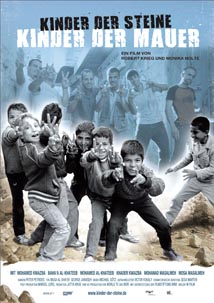
Starts February 24
 In 1989 director Robert Krieg covered the first Intifada (Arabic for “uprising”) of Palestinians against Israelis around Bethlehem in West Jordan Land in a documentary called Intifada Auf dem Weg nach Palästina. A famous photo from that film shows six young boys, about ten years old, throwing stones at the Israeli occupiers. In 2001 the Second Intifada occurred, much more serious than the first. Here no mere stones were thrown; instead, Israeli tanks rolled into West Jordan Land and occupied the area for 40 days, displacing families from their homes, upholding curfews and killing people. Whereas formerly, Palestinians could pass freely between the two countries, work in Tel Aviv or Jerusalem for a steady income or drive to the sea for a swim with their children, now the border is not only closed, but marked by a huge forbidding wall – a physical thing which was compared to the Berlin Wall more than once in this new film, made by Krieg with Monika Nolte.
In 1989 director Robert Krieg covered the first Intifada (Arabic for “uprising”) of Palestinians against Israelis around Bethlehem in West Jordan Land in a documentary called Intifada Auf dem Weg nach Palästina. A famous photo from that film shows six young boys, about ten years old, throwing stones at the Israeli occupiers. In 2001 the Second Intifada occurred, much more serious than the first. Here no mere stones were thrown; instead, Israeli tanks rolled into West Jordan Land and occupied the area for 40 days, displacing families from their homes, upholding curfews and killing people. Whereas formerly, Palestinians could pass freely between the two countries, work in Tel Aviv or Jerusalem for a steady income or drive to the sea for a swim with their children, now the border is not only closed, but marked by a huge forbidding wall – a physical thing which was compared to the Berlin Wall more than once in this new film, made by Krieg with Monika Nolte.
They travelled to Bethlehem to see the six boys: Mohamed K., Baha’a, Mohamed Al-K, Khader, Mohanad and Mosa, all young men now about 30 years old. They were excited about a reunion, because, in spite of being childhood friends, they had partly lost contact due to family duties, except for brothers Mohamed and Khader Kwazba.
Now, 20 years and a second Intifada later, with all the above-mentioned disastrous results and restrictions, life must go on. They work closer to home for less money and longer hours slaughtering chickens, selling cheap beaded necklaces to tourists, or changing money in a bank. Much of their domestic life plays out on their rooftop homes, from where they watch the forests of olive trees disappear as Israeli settlements sprout on the surroundings hillsides, joined together by modern highways accessible only to the settlers.
They discuss the Oslo Accords, the demands of the United Nations and their willingness to cooperate – all for nothing because slowly their territory is being absorbed into Israel – legally or not. If the borders were to re-open as liberally as in the past, would anyone continue to work in West Jordan Land? What if they were to be offered Israeli citizenship? Would they take it? They discuss the futility of their futures, their own political loyalties to either Hamas or Fatah, and realize that if friends cannot agree, then how can the governments agree?
In this excellent documentary we meet six very sympathetic, good-looking, young men for whom family is highly important. They help each other and work hard for the future of their children, even to the point of being willing to immigrate to another country if possible. As the film progresses, we realize that though they seem cheerful and optimistic, they are up against an uncertain future in a diminishing area which could possibly disappear completely. The Israelis are destroying what belongs to them. Then they will only have their memories, of childhood freedoms to play in these same now forbidden settlements.
